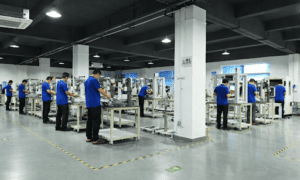China’s Xiaomi Corp announced on Tuesday that it had collected $5.5 billion through a larger share offering as it continues to pursue its ambitious goals for the production of electric vehicles.
TakeAway Points:
- At HK$53.25 a share, Xiaomi is selling 800 million shares.
- The deal was expanded from the selling of 750 million shares.
- The final price is 6.6% less than the stock closing on Monday.
- PsiQuantum, a firm in quantum computing, is seeking at least $750 million at a pre-money valuation of $6 billion.
Xiaomi is selling 800 million shares
The company sold 800 million shares at HK$53.25 each, the company said in its statement to the Hong Kong Stock Exchange.
Xiaomi, the world’s third-largest smartphone maker which moved into electric vehicle manufacturing last year, had planned to sell 750 million shares but increased the size of the deal while the bookbuilding process was underway.
The final price was towards the bottom end of the HK$52.80 to HK$54.60 price range flagged to investors when the deal launched on Monday.
The price was a 6.6% discount to Xiaomi’s closing price of HK$57 on Monday. Xiaomi said the money raised would be used to fund the acceleration of its business expansion, research and technology development.
Xiaomi began manufacturing EVs last year with the launch of the SU7 sedan after selling smartphones, household appliances and smart gadgets for most of its 15-year history.
Xiaomi reported last week an almost 50% jump in fourth-quarter revenue and raised its target for electric vehicle deliveries this year to 350,000 from 300,000.
It reported 32.1 billion yuan ($4.4 billion) in revenue for its EV business in 2024, delivering more than 135,000 SU7 sedans. Xiaomi said the company aimed to start shipping cars overseas in 2027.
The tech firm has purchased a new land plot of 52 hectares (128.5 acres) in Beijing’s south, where it would build the third phase of its auto factory as it ramps up annual shipment target, Chinese media has reported.
Xiaomi will invest a quarter about 7-8 billion yuan out of its 2025 total research and development budget of 30 billion yuan into AI, Xiaomi President Lu Weibing said last week.
Xiaomi’s deal extends a rush of tech-focused capital raisings from Chinese firms in Hong Kong, as companies take advantage of positive sentiment towards the tech sector.
A summit led by President Xi Jinping with top tech leaders last month was widely seen as a sign that strict government scrutiny of the sector which began in 2020 was easing.
Before Xiaomi’s share sale, Chinese firms had carried out $16.8 billion worth of equity capital market activity in the first quarter, according to LSEG data, more than double the same period last year.
Quantum computing startup PsiQuantum raising at least $750 million
Quantum computing startup PsiQuantum is raising at least $750 million at a $6 billion pre-money valuation, according to two people familiar with the matter.
BlackRock is leading the fundraising effort, which has not yet been completed, one of the people said.
Unlike some quantum computing startups using exotic materials, PsiQuantum is aiming to modify traditional manufacturing techniques from the semiconductor industry. The company uses existing photonics technology – the same kind of chipmaking used to make the fiber-optic connections for internet communications – at a factory run by GlobalFoundries in New York, saying it plans to make millions of quantum chips.
Scaling up those plans to make a high volume of quantum computing processors is a costly, complex endeavor and requires fundraising, one of the people said.
Startups and major tech firms alike are chasing quantum computing, which can solve complex problems that would take conventional computers thousands or millions of years, such as predicting how atoms and molecules will interact. Scientists hope to use quantum machines to develop new materials for batteries and new drugs.
New quantum computing chips
In recent months, Alphabet’s Google, Microsoft and Amazon have all unveiled new quantum computing chips. Last week, Nvidia, the world’s biggest chip firm, said that it will establish a quantum computing research center in Boston.
PsiQuantum is working with the governments in Australia and the United States to build two quantum computers in the coming years – one in Brisbane, Australia, and the other in Chicago.
Quantum computers have been around for decades but have produced too many errors to be more useful than conventional computers. In recent years, companies have made advances in making better quantum chips and correcting those errors, with PsiQuantum saying it believes it will have a useful machine by 2029 or sooner and Google saying earlier this year that it will have useful quantum applications within five years.



































